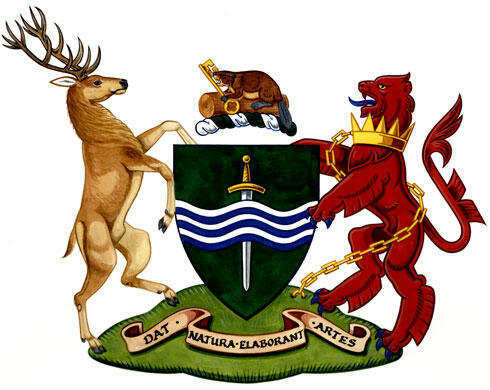The contents of this Register are intended for research purposes only. The heraldic emblems found in the Register may not be reproduced in any form or in any media without the written consent of the Canadian Heraldic Authority and/or the recipient.
Peterborough, Ontario
Registration of Arms and Supporters
June 17, 1999
Vol. III, p. 323
Arms of the City of PeterboroughBlazonVert a sword point downwards Argent pommel and hilt Or surmounted by a fess barry wavy of six Argent and Azure; SymbolismThe green background represents the forests around Peterborough and also commemorates the Irish settlers who were among its first residents. The plain green field (champ plain in French) is also a reference to Samuel de Champlain, who was the first European explorer to visit the region. The sword honours the British soldiers who settled in the area after the Napoleonic Wars and the War of 1812. The white and blue wavy stripes represent the Otonabee River and the lakes and waterways of the area. |
CrestBlazonUpon a log of wood fesswise a beaver proper grasping with the sinister paw a key ward upwards Or and to the sinister; SymbolismThe beaver is a symbol of Canada. The key represents Saint Peter and the Catholic faith of the Irish settlers. It also refers to the city’s founder, Peter Robinson, who gave his name to the town. |
MottoBlazonDAT NATURA ELABORANT ARTES; SymbolismThis Latin phrase means “Nature provides, industry develops.” |
SupportersBlazonOn a grassy mound Vert dexter a stag proper and sinister a lion Gules gorged with an Eastern crown and chain reflexed over the back Or; SymbolismThe stag represents the wildlife of the region and is also found in the arms used by people with the surname Robinson. The red lion is one of the supporters of the arms of the Duke of Wellington, under whose command many of the soldier settlers fought. The green of the field alludes to the Irish settlers. |
Additional InformationCreator(s)Not available PainterNot applicable CalligrapherNot applicable Recipient TypeCivil Institution
Other InformationThe recipient’s emblems were originally recorded in the records of the College of Arms, London, England, 9 May 1950. |



